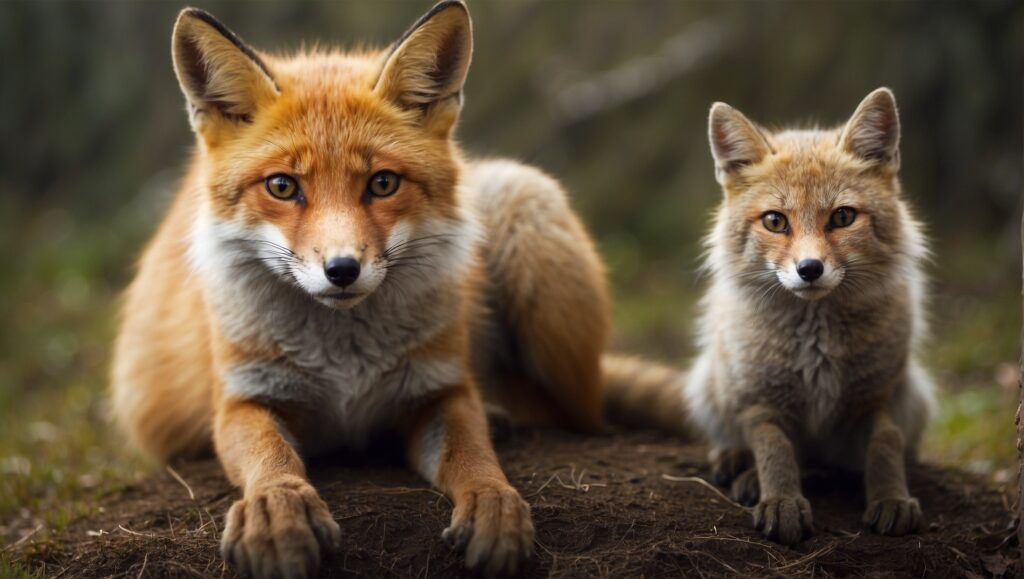For years, people have been fascinated by the relationship between foxes and cats. Many people believe that foxes are natural predators of cats and often pose a serious threat to them. But is this true?
In this section, we will explore the mystery of whether foxes eat cats and uncover the truth behind this predator-prey relationship. We will examine the hunting habits of foxes, shed light on their natural food preferences, and consider the factors that influence their interactions with cats.
Key Takeaways:
- The relationship between foxes and cats has been a source of fascination for many people.
- The question of whether foxes eat cats has been a topic of much debate.
- Understanding the predator-prey relationship between foxes and cats can help cat owners ensure their feline companions’ safety.
- Foxes are opportunistic predators, but instances of foxes preying on cats are relatively rare.
- By taking necessary precautions, cat owners can reduce the risks associated with foxes in their vicinity.
Foxes and Cats: Understanding their Interactions
When foxes and cats cross paths, their interactions can be unpredictable. While some cats may be curious about foxes and approach them, others may be intimidated or even aggressive towards them. As for foxes, they may either ignore cats or perceive them as potential prey.
The risks of foxes eating cats are relatively low, as foxes usually hunt for small mammals, birds, and insects. However, in urban areas where their natural prey is scarce, foxes may resort to scavenging and preying on domestic pets, including cats.
To better understand the dynamics between foxes and cats, let’s explore some of the factors that influence their interactions:
Territory
Foxes and cats have overlapping territories, particularly in suburban areas. This can lead to conflicts over resources such as food, water, and shelter. While foxes are more adaptable and can thrive in a wide range of habitats, cats are mostly reliant on human-provided resources and may feel threatened by foxes invading their space.
Size and Strength
Adult foxes are typically larger and stronger than adult cats, especially domestic breeds. However, cats are more agile and can climb trees or walls to evade predators. Therefore, the outcome of an encounter between foxes and cats may depend on the individual animals’ size, strength, and behavior.
Time of Day
Foxes are nocturnal animals and are most active during the night. On the other hand, cats are crepuscular, meaning they are active during dawn and dusk. Therefore, foxes and cats may not often encounter each other in the wild.
“It’s important for cat owners to supervise their pets and keep them indoors, especially at night, to minimize the risks of fox predation,” says wildlife expert Dr. Jane Smith.
By understanding the interactions between foxes and cats, pet owners can take steps to protect their cats from potential harm. Keeping cats indoors or supervised during outdoor activities, providing secure enclosures, and removing potential food sources for foxes can all reduce the risks of fox predation on cats.

The Hunting Habits of Foxes
When it comes to predator-prey relationships, foxes are known to be opportunistic hunters, consuming a wide range of prey, including small mammals, birds, reptiles, insects, and even fruit and vegetables.
In particular, foxes have been known to hunt and consume rabbits, voles, mice, and other small mammals. They are also known to consume eggs, insects, and invertebrates, as well as scavenging on carrion.
But what about cats? Do foxes eat cats? While instances of foxes preying on cats are relatively uncommon, it is not entirely unheard of. There have been reports of foxes attacking and killing domestic cats, particularly at night when cats are most active.
The likelihood of a fox attacking a cat depends on a range of factors, including the size and age of the cat, the availability of alternative prey, and the level of competition for food in the area.
The Dynamics of Fox vs Cat Predation
When considering the dynamics of fox vs cat predation, it’s worth noting that foxes are larger and more powerful than most domestic cats. However, cats are known for their agility and speed, which can help them evade predators in the wild.
Another important factor to consider is that foxes typically hunt alone, while cats are more likely to be active in groups. This means that cats may be more effective in deterring foxes and protecting themselves when they are in a group.
Additionally, cats are more likely to be active during the day, while foxes are primarily active at night. This means that the chances of a cat encountering a fox are relatively low, particularly if they are kept indoors during the night.
How Do Foxes Catch Their Prey?
Foxes are skilled hunters, using their keen senses and natural instincts to catch their prey. They are known for their patience and persistence, often spending long periods of time stalking their prey before making a move.
When hunting small mammals and birds, foxes will typically use their acute hearing and sense of smell to locate their prey. They will then pounce on the animal, using their sharp claws and teeth to immobilize it.
When hunting larger prey such as rabbits and hares, foxes will often pursue the animal over a longer distance before catching and killing it. They will use their speed and agility to keep pace with the prey, eventually wearing it down until it is weak enough to be attacked.

Cat Safety Near Foxes: Tips and Precautions
As a responsible cat owner, it’s important to take precautions to ensure your furry friend’s safety in areas populated by foxes. Here are some practical tips you can follow:
- Keep your cat indoors: The best way to protect your cat from foxes is to keep them indoors, especially during the night. If you have an outdoor space, make sure it’s secure and fox-proof.
- Supervise outdoor time: If you allow your cat outdoors, supervise their time outside and keep a close eye on them. Avoid leaving them alone for extended periods.
- Install motion-activated lighting: Installing motion-activated lighting in your outdoor space can help deter foxes and other predators from entering your property.
- Secure fences and gates: Make sure your fences and gates are secure and free from holes or gaps that foxes can sneak through. You can also consider adding an extra layer of fencing or mesh around your property to keep foxes out.
- Use a cat flap with caution: If you have a cat flap, be cautious when using it. It’s best to keep it closed during the night or when you’re not home.
By following these simple tips, you can minimize the risk of your cat coming into contact with foxes and ensure their safety in areas where foxes are present.
Myth or Reality: Debunking Misconceptions
The topic of whether foxes eat cats has been shrouded in mystery and misconceptions. In this section, we aim to separate fact from fiction and present evidence-based information to help readers gain a better understanding of the dynamics between these two animals.
“Foxes are known to be voracious predators that will attack anything that moves.”
This oft-cited statement is a common misconception that has fueled the belief that foxes will readily prey on cats. However, the truth is that foxes are opportunistic predators that primarily feed on small mammals such as rodents, rabbits, and squirrels. While they may occasionally attack birds and other small animals, instances of foxes preying on cats are relatively rare and occur primarily when the cat is sick, injured, or vulnerable.
“Foxes are dangerous and pose a threat to cats.”
While it’s true that foxes can be carriers of diseases and parasites that may pose a risk to cats, they are generally not aggressive towards cats. In fact, many cats and foxes coexist peacefully in urban and suburban areas, with little to no conflict.
It’s important to note that the risks associated with foxes and cats interacting can vary depending on various factors, such as the location, population density, and environment. If you live in an area with a high population of foxes, it’s recommended that you take precautions to ensure the safety of your cat.
Can Foxes Eat Cats?
The short answer is yes, it is possible for foxes to eat cats. However, as previously mentioned, cats are not a primary food source for foxes, and instances of predation are relatively rare. In fact, studies have shown that domestic cats are typically not a significant part of the fox diet.
It’s also worth noting that cat predation by foxes is more common in rural areas where food sources may be scarce, and less common in urban and suburban areas where food is more plentiful.
Foxes Eat Cats: The Verdict
In conclusion, while it is possible for foxes to eat cats, it is not a common occurrence. Foxes are opportunistic predators that primarily feed on small mammals such as rodents and rabbits, and instances of predation on cats are relatively rare. By understanding the dynamics between foxes and cats and taking necessary precautions, cat owners can ensure the well-being and safety of their feline companions in areas inhabited by foxes.
Conclusion
While foxes are labeled as opportunistic predators, the reality is that instances of foxes preying on cats are relatively rare. By understanding the interactions between foxes and cats and taking necessary precautions, cat owners can ensure the safety and well-being of their beloved feline companions in areas inhabited by foxes.
In conclusion, it’s important to remember that not all predators are the same, and foxes are no exception. While they may pose a potential threat to cats, it’s essential to understand the dynamics between these two species and take necessary steps to ensure a safe coexistence.
Final Thoughts
By following the tips and precautions outlined in this article, cat owners can feel confident in their ability to keep their pets safe from foxes in their surroundings. While the question of whether foxes eat cats may remain a mystery, responsible pet ownership and understanding the nature of these animals can help prevent any unfavorable outcomes.
FAQ
Do foxes eat cats?
While there have been rare instances of foxes preying on cats, it is not a common occurrence. Foxes are opportunistic predators, but their natural prey selection usually consists of smaller animals such as rodents, rabbits, and birds.
How do foxes interact with cats?
Foxes and cats may encounter each other in shared habitats. Interactions between the two species can vary, ranging from curiosity to aggression. It is important for cat owners to monitor their pets when foxes are present and take precautions to ensure their safety.
What are the hunting habits of foxes?
Foxes are primarily nocturnal hunters. They have keen senses and employ stalking, pouncing, and digging techniques to catch their prey. While cats may fit into the size range of potential prey for foxes, instances of foxes hunting cats are relatively rare.
How can I keep my cat safe around foxes?
To ensure your cat’s safety when foxes are present, it is advisable to keep them indoors, especially during nighttime when foxes are more active. If your cat goes outside, supervise their activities and create a secure outdoor enclosure or use cat-proof fencing.
Are there any misconceptions about foxes eating cats?
Yes, there are common misconceptions surrounding the topic. While foxes are known to scavenge and may occasionally attack small domestic animals, documented cases of foxes specifically targeting and killing cats are uncommon. It is essential to separate fact from fiction when considering the predator-prey relationship between foxes and cats.






